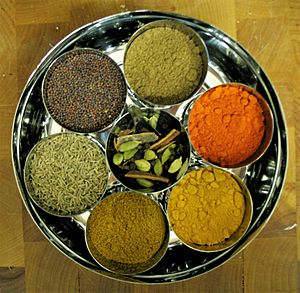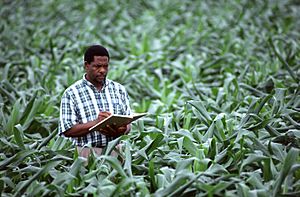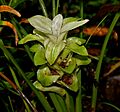Indian Institute of Spices Research facts for kids
 |
|
|
Former names
|
Regional Station of CPCRI National Research Centre for Spices (NRCS) |
|---|---|
| Type | Autonomous Organization |
| Established | 1975 |
| Location |
,
,
11°17′38″N 75°49′13″E / 11.29395°N 75.82038°E |
| Campus | Vellimadukunnu (Marikkunnu), Kozhikode |
| Nickname | IISR |
 |
|
The Indian Institute of Spices Research (IISR) is a special organization in India. It focuses on agricultural research about spices. The main office of IISR is in Kozhikode, Kerala. It is part of the Indian Council of Agricultural Research (ICAR) in New Delhi. ICAR works under the Ministry of Agriculture, India.
Contents
History of IISR
The story of IISR began in 1971. The ICAR started a project. This project aimed to improve spice crops. It was first located at the Central Plantation Crops Research Institute (CPCRI) in Kasaragod.
In 1975, the project became a regional station. Its base moved to Kozhikode. Later, in 1986, this station joined with the Cardamom Research Centre. This new center was called the National Research Centre for Spices (NRCS). Finally, in 1995, the NRCS became what we know today as the Indian Institute of Spices Research.
What IISR Does (Mandate)
IISR has five main goals. These goals help farmers, industries, and researchers.
Helping Farmers and Protecting Resources
IISR helps farmers and planters. It works to save the genetic resources of spices. This includes protecting the soil, water, and air where spices grow.
Their programs involve collecting and studying spice plants. They also work on ways to grow spices sustainably. This means growing them without harming the environment.
Developing Better Spices and Growing Methods
IISR aims to create new spice varieties. These varieties have high yields and good quality. They also develop ways to protect spices from pests and diseases. They use both old and new methods, including biotechnology.
Their work includes breeding new spice plants. They look for plants that resist drought and diseases. They also find ways to identify and fight pests and diseases. IISR helps farmers manage pests and diseases in a combined way. They also produce healthy young spice plants for farmers.
Improving Spice Products
IISR develops new ways to process spices after harvest. They focus on making new spice products. This helps both local markets and exports.
They study how to add value to spices. They also look into the health benefits of spices. This includes studying nutraceuticals and how spices affect the body.
Training and Coordinating Research
IISR acts as a training center. They teach people about research methodology for spices. They also help improve spice technologies. IISR coordinates national research projects on spices.
They offer training and help spread information. They also create special software and systems for spice knowledge.
Guiding Research for Farmers' Needs
IISR monitors how new technologies are used. This makes sure their research helps farmers directly. They want to meet the needs of the farming community.
Their programs include studying the economics of spices. They also provide training and information to farmers.
How IISR Helps (Service Profile)
IISR offers services in three main areas: research, education, and helping farmers.
Research on Spices
The Institute has great facilities for spice research. They work on many topics:
- Collecting and studying different types of spice plants.
- Creating new spice varieties. These varieties have high yields and resist problems. They use both traditional and biotechnological methods.
- Finding the best ways to grow spices. This helps produce many healthy plants.
- Developing farming techniques to increase spice production.
- Managing pests and diseases in a combined way.
- Improving how spices are processed after harvest.
- Studying the social and economic parts of growing and selling spices.
- Investigating the health benefits of spices.
Education Corner
IISR also helps students learn and do research. They offer programs for Masters and PhD students.
PhD Programme: IISR works with several universities. These include Mangalore University and Kerala Agricultural University. Students can do their PhD research in many subjects. These subjects include Biochemistry, Biotechnology, Plant Breeding, Horticulture, and Plant Pathology.
MSc/MTech Project: Students studying for their MSc or MTech can do project work at IISR.
MPhil Thesis Work: Students in MPhil programs can write their thesis with IISR scientists.
Post MSc/MTech Training: People with MSc or MTech degrees can get extra training. They work with scientists at the institute.
Farmers' Corner
IISR has many projects to help spice farmers. The All India Coordinated Research Project on Spices (AICRPS) is one example. IISR also provides useful information for farmers:
- Package of Practices: Guides on how to grow different spices. These are available online.
- Pamphlets: Information booklets in Malayalam.
- Planting Materials: Details on where to get young spice plants and their cost.
- Spice Varieties: Information about the best spice varieties from IISR.
- Success Stories: Examples of how IISR technologies have helped farmers.
Spices IISR Works With
IISR focuses on ten important spice crops:
- Garcinia (like Garcinia gummi-gutta)
- Black pepper (Piper nigrum)
- Ginger (Zingiber officinale)
- Clove (Syzygium aromaticum)
- Cardamom (Elettaria cardamomum)
- Nutmeg (Myristica fragrans)
- Turmeric (Curcuma longa)
- Cinnamon (Cinnamomum verum)
- Paprika (Capsicum annuum)
- Vanilla (Vanilla planifolia)
Facilities at IISR
IISR has many modern laboratories and other helpful facilities.
Laboratories and Equipment
IISR has several well-equipped labs:
Centralized Molecular Biology facility: This lab has tools to study plant DNA and genes. It includes systems for PCR and gel documentation.
Centralized Biochemistry laboratory: This lab checks the quality of spices. It studies their health benefits and how plants work. It has advanced machines like HPLC and gas chromatographs.
Centralized Soil Chemistry lab: This lab studies soil and plant nutrients. It has special equipment like an atomic absorption spectrophotometer.
Centralized Plant Protection lab: This advanced lab helps fight plant pests and diseases. It has different types of microscopes and freezers.
GCMS facility: This special machine helps identify the aroma compounds in spices.
Biocontrol laboratory: This lab grows helpful organisms. These organisms can control pests naturally.
Library and Information
IISR has a large library called the National Informatics Centre on Spices (NICS). It holds scientific books, online journals, and databases. The library is automated and has a special online portal called SpicE- Library. It also has a digital collection called ‘D-Spice’. The library has thousands of books, journals, and reports.
DUS Testing Facility
IISR has a lab for DUS testing. DUS stands for Distinctiveness, Uniformity, and Stability. This lab checks if new crop varieties are truly unique and stable.
Tissue Culture Accreditation Facility
IISR also certifies spice plants grown using tissue culture. In this lab, they test tissue-cultured spices. They check for viruses and make sure the plants are genetically correct.
Other facilities include a Bioinformatics Centre. This center combines biology and computer science. There is also a Geographic Information System (GIS) center. It uses maps and remote sensing to gather information. IISR also has a large Conference Hall and a Guest House.
Agricultural Technology Information Centre (ATIC)
The ATIC is a part of IISR. It helps spread new technologies to farmers. Its main activities include:
- Giving out good quality planting materials.
- Producing and sharing printed information.
- Offering advice to farmers. This includes helping diagnose crop problems.
- Sharing information using videos and interactive systems.
- Supporting institute activities with audio-visual aids.
- Organizing events like exhibitions and seminars for farmers.
Krishi Vigyan Kendra (KVK)
The Krishi Vigyan Kendra (KVK) was set up in 1992. It is in Peruvannamuzhi village in Kozhikode. KVK is a part of IISR. Its main goal is to share technology with farmers. KVK is located at the IISR experimental farm. KVK offers services like:
- Advice for farmers.
- Producing and supplying helpful fungi like Trichoderma.
- Providing improved breeds of chicks.
- A center for plant and animal health.
Awards and Recognitions
IISR has received several important awards. It won the Outstanding ICAR Institution Awards in 1999, 2009, and 2021. It also received the ICAR Best Annual Report Award for 1996–97. Many scientists at IISR have also been honored for their work.
Images for kids
 | Chris Smalls |
 | Fred Hampton |
 | Ralph Abernathy |












